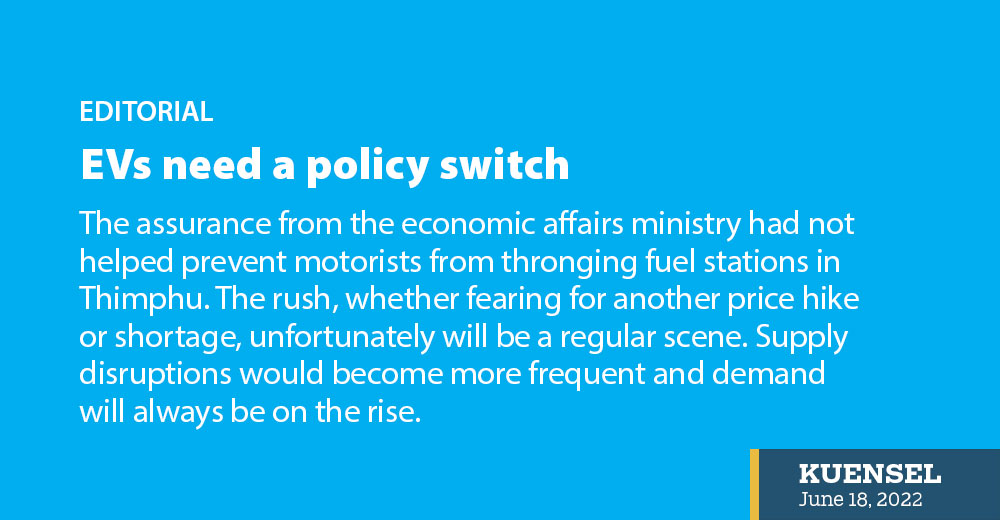The assurance from the economic affairs ministry had not helped prevent motorists from thronging fuel stations in Thimphu. The rush, whether fearing for another price hike or shortage, unfortunately will be a regular scene. Supply disruptions would become more frequent and demand will always be on the rise.
The writing was there on the wall. The number of vehicles is increasing faster than the rate of fuel hike. When the information and communication ministry readied the second draft of the National Transport Policy, 2017, there were 83,000 vehicles registered in the country. Since then, we have added more than 7,000 vehicles, on average, on our roads every year. The policy, comprehensive it may be, after five years is still not approved.
The recent incidents of fuel shortage and the price hike should get some policy attention. To start with, the draft policy which is now with the Gross National Commission Secretariat should receive some urgency. Current global events are forcing many governments to relook into their policies – from food and energy security to dependence on imports. It is an opportunity for Bhutan to reshape our policies.
The statistics are frightening. The country’s biggest export, hydropower, is not able to meet the demand for fossil fuel. In 2020, our overall balance of trade including electricity was about Nu 18.38 billion in the red. Half of the import bill is from fossil fuel import. It would be worse when the next report is published with more vehicles imported and hike in price of petrol and diesel. Worse, we have no control over the price of import of fossil fuel and even export of electricity.
Bhutan should have a policy to promote not only efficient or affordable, but also sustainable and environment-friendly transport systems. The current position we are in is a good time. Going electric is a good opportunity. But electric vehicles (EV) are expensive and out of reach for many. It is here that some policy interventions could encourage people to switch to electric vehicles.
Is it too much to ask for financial institutions to provide cheaper loans with longer repayment durations for first time car buyers? The EV taxi project is a successful one because of the subsidies. It would be too much to extend the subsidy to all car buyers, but making it affordable through schemes like cheaper loans could make many go electric. Cheap loans and smart schemes were the reasons for the uncontrolled growth in vehicle numbers.
EVs need reliable infrastructure. There has to be enough charging stations across the country, EV repair shops and our roads have to be EV-friendly (smoother). And there could be incentives like tax rebates on EVs and its spare parts. There are demands to do away with the green tax on fossil fuel to bring down the cost of fuel. It should be the other way round. Lucrative subsidies on EVs and surcharge on diesel or petrol luxury cars, second or third cars could discourage people from buying fuel driven cars.
Another policy should be scrapping old vehicles after a certain time. Old vehicles are fuel guzzlers and not environment-friendly. Many countries do not allow vehicles that are more than 20 years old. Some of the vehicles on our roads are older than the drivers or owners.
We have been lauded for our environment policies, replacing 50 percent of the vehicles on our roads with EVs, except heavy vehicles, would be another feather on our cap. It would help us in our balance of trade too.


